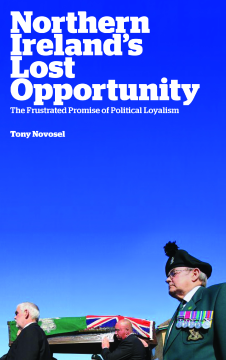
Additional Information
Book Details
Abstract
Rejecting the dominant narratives of the Troubles, this is a unique in-depth investigation into working-class Loyalism in Northern Ireland, as represented by the Ulster Volunteer Force (UVF), the Red Hand Commando (RHC) and their political allies.
In an unorthodox account, that disputes the idea that loyalism was apolitical and sectarian, Tony Novosel argues that loyalist groups, seen as implacable enemies by Republicans and the left, developed a political analysis of the Northern Ireland conflict in the 1970s which involved a compromise peace with all political parties and warring factions - something that historians and writers have largely ignored.
Distinctive, deeply informed and provocative, Northern Ireland's Lost Opportunity is the first study to focus not on the violent actions of the UVF/RHC but on their political vision and programme which, Novosel argues, undeniably contributed to the Conflict Transformation Process, by upholding the potential for a viable peace based on compromise with all groups, including the Irish Republican Army.
'Integral to an understanding of the Conflict Transformation Process which has made Northern Ireland a beacon of hope, and adds a vital component to the complex narrative of our recent history'
Dr John Kyle, Progressive Unionist Party, Belfast City Councillor
'A significant contribution. Exposes the limitation of commonly held views that loyalism was apolitical and merely sectarian'
Professor Peter Shirlow, School of Law, Queen’s University Belfast
'Novosel effectively challenges common perceptions. He demonstrates that some Loyalists offered hope when hope was most needed but faced constant obstruction by those challenged by their 'new thinking'
Roy Garland, Irish News
'Novosel's study of the UVF and its attempts to develop a politicised loyalism challenges the standard one-dimensional representation of loyalism that so dominates the media and popular imagination'
Graham Spencer, Reader in Politics, Conflict and the Media at the University of Portsmouth, UK and author of The State of Loyalism in Northern Ireland.
Table of Contents
| Section Title | Page | Action | Price |
|---|---|---|---|
| Cover | Cover | ||
| Contents | vii | ||
| Acknowledgements | ix | ||
| Abbreviations | xii | ||
| Glossary of Terms | xiv | ||
| Preface and Overview | xvii | ||
| Introduction | 1 | ||
| 1. The Ulster Volunteer Force and O'Neill | 14 | ||
| 1965-66: The UVF and the UPV | 15 | ||
| 1966-69: Civil Rights to Civil War | 21 | ||
| 1969: The End of O'Neill | 26 | ||
| 1970: The Red Hand Commando | 28 | ||
| 1972: Reorganisation of the UVF | 29 | ||
| Conclusion | 32 | ||
| 2. Manipulation, Acquiescence and Awakening | 34 | ||
| 50 Years of Misrule | 37 | ||
| Radicalism and Reaction | 44 | ||
| Manipulation and Acquiescence | 47 | ||
| The Awakening and the Split | 53 | ||
| Conclusion | 60 | ||
| 3. The Prison Experience and Loyalist Politics | 62 | ||
| The Long Kesh University | 63 | ||
| Gusty Spence | 64 | ||
| Spence University | 68 | ||
| Engagement | 73 | ||
| The Camp Council | 75 | ||
| The Downtown Office Scheme | 81 | ||
| Conclusion | 86 | ||
| 4. The Emerging Light: Political Loyalism 1973-75 | 88 | ||
| Introduction | 88 | ||
| The Rise of Politics | 90 | ||
| 'Enlightened Ulstermen' | 93 | ||
| The Demise of the VPP | 118 | ||
| Conclusion | 123 | ||
| 5. Darkness at the End of the Tunnel: The Failure of Politics | 124 | ||
| Provisional Republicanism | 125 | ||
| Protestant Attitudes and the Protestant Working Class | 134 | ||
| British Policies: Criminalisation, Ulsterisation, Marginalisation | 140 | ||
| Unionism and Loyalism | 144 | ||
| The 'Red Scare' | 144 | ||
| TARA and M15 | 150 | ||
| Conclusion | 158 | ||
| 6. The Light in the Darkness: Political Loyalism, 1975-77 | 162 | ||
| Politics of Compromise | 164 | ||
| The Spence Oration 12 JUly 1977 | 169 | ||
| Remembrance Day Speech 1977 | 176 | ||
| Conclusion | 177 | ||
| 7. Sharing Responsibility: 1977-87 | 179 | ||
| Sharing Responsibility, 1985 | 193 | ||
| The Anglo-Irish Accord | 195 | ||
| War or Peace? Conflict or Conference? | 196 | ||
| The Unionist Task Force | 197 | ||
| Conclusion | 200 | ||
| Conclusion: The Lost Opportunity | 206 | ||
| Notes | 220 | ||
| Bibliography | 253 | ||
| Index | 265 |
